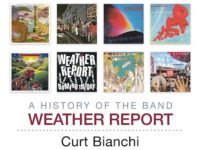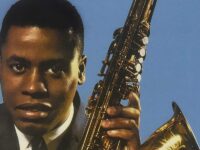Weather Report founders Joe Zawinul and Wayne Shorter, fresh off a stint in Miles Davis’ band, took a surprising turn on their next project. Again, they worked with equal skill outside the structure of jazz — tossing the straight-ahead nomenclature of soloist-and-accompaniment for a nervy cacophony of continuous improvisation by every member — even as they embraced the outsider vibe of rock.
It’s similar, in its way, with Davis’ Bitches Brew or In a Silent Way, but this isn’t a debut with the same deep groove. Instead, like the otherworldly artwork that graces the album cover, Weather Report seeks a higher level — sometimes, as with the upper-register work by Zawinul on the keyboard and bassist Miroslav Vitous, not to mention the turn on soprano by Shorter … quite literally.
That’s why Weather Report, a daring adventure at the time, holds up well today as one of the best experiments in then-new fusion sound. Not because it aped the heaviness of that era’s similarly tagged offerings, but because it transcended those expectations with the lightest touch.
“Milky Way,” the Shorter/Zawinul original that opens the album, boasts non-tonal, acoustic-based rhythmic atmospherics that rival anything our computer age could imagine. Weather Report tosses out the standard jazz approach — theme, solo, theme — but also the whole funk dynamic that had characterized their more recent, celebrated work alongside Miles Davis.
The group on this date is rounded out by percussionist Airto Moreira and drummer Alphonse Mouzon. Vitous — often adding another horn-like voice with his bow work — was part of the first four efforts by Weather Report, while Moreira and Mouzon immediately departed for bands led by Chick Corea and Larry Coryell, respectively. Vitous’ exit was reportedly over his frustration at being limited to funk-associated bass lines, which so often can be repetitive vamps. There is little of that structure here.
Instead, on Weather Report they left us something magical, in the most complete sense. The band remains, on balance, vividly outside of the “jazz” paradigm and then the subsequent “fusion” paradigm. They play individually, and all at once, creating something new and then newer still.
That, to me, is why Weather Report was, and is, a supple surprise — and why it’s kept better than more favored commercial successes like 1977’s Heavy Weather. Where that one tended toward arena-grade bombast, here you have Zawinul’s “Orange Lady” — a delicately beautiful exploration.
[SOMETHING ELSE! INTERVIEW: Alphonse Mouton discusses hanging out with Yes and Led Zeppelin, career-making performances with Weather Report and McCoy Tyner — and, yes, those funky, funky outfits.]
Not to say the groundwork isn’t laid for those later, more conventional fusion successes, notably on Way e Shorter’s “Tears” and Miroslav Vitous’ “Seventh Arrow.” Going further back into the tradition, “Eurydice” retains the DNA of bop, if barely. But those moments work more as a counterpoint on Weather Report, a recording of lingering romance, vision and restraint.
So sensitive an effort that it included shadings created not by Joe Zawinul’s fingers but by Wayne Shorter playing his sax near enough that its vibrations moved the piano’s inner strings, Weather Report isn’t commercial, and maybe doesn’t feel overt enough on the first listen. But there are deeper intricacies to behold, and this depth of emotion to go with the thrilling interplay of new ideas.
It ended up being perhaps Weather Report’s most honest record. You just have to lean in closer to appreciate it.
- Nick DeRiso’s Best of 2015 (Rock + Pop): Death Cab for Cutie, Joe Jackson, Toto + Others - January 18, 2016
- Nick DeRiso’s Best of 2015 (Blues, Jazz + R&B): Boz Scaggs, Gavin Harrison, Alabama Shakes - January 10, 2016
- Nick DeRiso’s Best of 2015 (Reissues + Live): John Oates, Led Zeppelin, Yes, Faces + others - January 7, 2016





This under rated album finally showed up one day, I listened and now I listen some more.